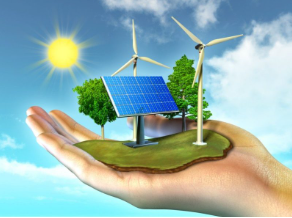Nigeria is a strategically positioned tropical country, close to the Atlantic Ocean. Nigeria’s renewable energy potential is quite huge, being exposed to an abundance of natural elements. From plentiful solar energy to swift winds, ocean currents, waterfalls rivers, and biomass, there are more than enough sources.
The United Nations website states the clear advantages of using renewable energy sources over fossil fuels. From cheaper costs to a cleaner and more environmentally friendly impact, Nigeria’s renewable energy sources can power projects with huge economic benefits. However, it will take the active cooperation of the government and private stakeholders to establish and implement an effective energy policy. It must be channeled into improving the well-being and socioeconomic activities of all classes of citizens and foreign investors. The green energy revolution can transform Nigeria’s renewable energy potential into a powerhouse of wealth and innovative solutions if taken seriously.
Renewable Energy: Its Scope and Benefits
The United Nations defines renewable energy as:
‘…. energy derived from natural sources that are replenished at a higher rate than they are consumed. Sunlight and wind, for example, are such sources that are constantly being replenished. Renewable energy sources are plentiful and all around us.’
Furthermore, the esteemed world body highlights the relative advantage of renewable energy sources over fossil fuels thus:
‘Fossil fuels – coal, oil, and gas – on the other hand, are non-renewable resources that take hundreds of millions of years to form. Fossil fuels, when burned to produce energy, cause harmful greenhouse gas emissions, such as carbon dioxide.
‘Generating renewable energy creates far lower emissions than burning fossil fuels. Transitioning from fossil fuels, which currently account for the lion’s share of emissions, to renewable energy is key to addressing the climate crisis.
Renewables are now cheaper in most countries, and generate three times more jobs than fossil fuels.’
Renewable energy sources include:
Solar, geothermal, wind, biomass, ocean tides, flowing waters (such as rivers and waterfalls), ocean waves, and energy derived from temperature changes.
These are natural sources that are continually being renewed or generated practically daily, without negatively impacting the environment. They also release vast amounts of energy which should not be ignored. Of all these sources, Nigeria has only managed to harness hydroelectric energy in fairly large amounts (from rivers such as River Niger).
Much of Nigeria’s electrical power grid is presently sustained by generating plants fuelled with natural gas – at a staggering 80 percent. Which of course is far more expensive to maintain, coupled with the effect of currency exchange (since natural gas is procured in US Dollars). This will naturally push the cost of power generation and distribution higher.
In addition, a 2023 Levelized Cost of Energy report shows how renewable energy plants are relatively cheaper than conventional power plants. Components such as solar panels, turbine blades, and several others, are now less expensive with modern technology. Thus, renewable energy projects can now be set up at a lower cost.
Towards Boosting Nigeria’s Renewable Energy Potential: The Electricity Act 2023
The increasing recognition of the value of renewable energy in Nigeria came to the fore when the Electricity Act 2023 was passed into law. The enactment of the Electricity Act signaled a definite transition towards boosting Nigeria’s renewable energy potential and significantly transforming the energy sector. Furthermore, it shows Nigeria’s commitment to fully comply with the provisions of the Paris Agreement (about curbing the effects of climate change). If fully implemented, the Electricity Act 2023 will significantly reduce carbon emissions, thus helping Nigeria to create a sustainable and cleaner environment.
However, promoting the increased usage of renewable energy in Nigeria through the Electricity Act will need to scale certain hurdles. Financing such projects; integrating several sources of energy; and infrastructural development are among those challenges. Thus, in a bid to overcome them, the Ministry of Power has been mandated to prepare the uuuuuuuu. The plan is poised to implement the following provisions:
- High-impact utilization of renewable sources;
- Setting up a variety of generation-to-distribution systems;
- Implementation of off-grid and mini-grid power systems;
- Provision of infrastructure; and
- Alignment of the expansion of power generation, transmission, and distribution.
With these in place, Nigeria hopes to ‘increase renewable energy to 30% of the electricity mix by 2030’ through the Sustainable Energy for All initiative. The proposed energy plan also seeks to produce more renewable energy for transportation, and domestic and industrial uses.
The problem of price volatility, with the ever-increasing local and international prices of fossil fuels, is thus eliminated through renewable energy. Without a doubt, renewable energy is poised to improve Nigeria’s economic growth potential. It will also enhance greater access of rural dwellers in Nigeria to electricity. This can be achieved under the proposed Rural Electrification Agency and the Rural Electrification Fund (sections 128 and 143 of the Electricity Act 2023 respectively). The plan is to set up mini-grid and off-grid renewable power solutions to that end. All these will be done with support from the National Electric Regulatory Commission (NERC).
Further Measures to Improve Nigeria’s Renewable Energy Potential
To support renewable energy projects in Nigeria, it is pertinent for the government to provide financial incentives. These include tax waivers and subsidies, which could be granted to both investors and consumers.
For instance, section 141(5) of the Electricity Act empowers the Rural Electrification Fund to provide capital subsidies to qualified rural electrification projects. Section 122 intends to subsidize power for low-income consumers. The same act empowers the Rural Electrification Agency to facilitate the procurement of low-interest loans, tax incentives, and investment capital arrangements. These will be provided for local entrepreneurs in the renewable energy sector.
The Federal Ministry of Finance is equally empowered by the Act to offer tax incentives and reliefs. They will help providers in the implementation, generation, and consumption of renewable energy products within the nation.
Yet again, section 82 of the Electricity Act proposes to establish the National Hydroelectric Power Producing Areas Development Commission. The parastatal will be charged with the formulation of policies and guidelines that will promote the development of hydroelectric power-producing areas.
And finally, the Electricity Act makes provision for the establishment of partnerships between various stakeholders in the renewable energy sector. One such partnership is the Memorandum of Understanding between Oando Clean Energy Limited and the Rural Electrification Agency to set up the Solar Power Naija program. Encouraging more such partnerships, especially between public and private providers in the renewable energy sector, is a laudable initiative.
With additional technology inputs to sustain and improve such projects, Nigeria’s renewable energy potential will soar to international standards. The local consumers of power will enjoy a cleaner and more sustainable power supply, leading to improved livelihoods and well-being.








